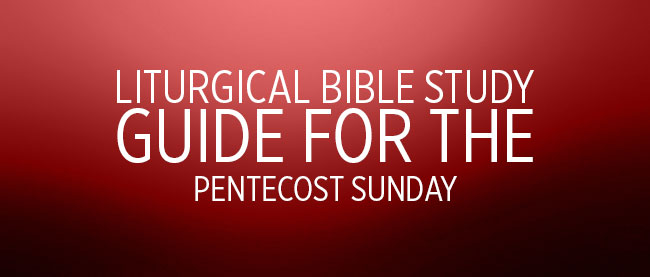1st Reading – Acts 2:1-11
The setting is fifty days after the first Easter, ten days since Christ has ascended and left the disciples with responsibility for administering His Church. Before He ascended He had told them “Do not leave Jerusalem, but wait for the gift my Father promised, which you have heard me speak about. For John baptized with water, but in a few days you will be baptized with the Holy Spirit” (Acts 1:4-5). So, after the ascension, the disciples returned to Jerusalem and the Upper Room. While there, the eleven selected by lot Matthias to take Judas’ place, showing that the office of Bishop is to be a perpetual office [as Acts 1:20 (KJV) says, quoting Psalm 109:8, “and his bishopric let another take”].
2nd Reading -1 Corinthians 12:3b-7, 12-13
This reading should sound familiar to us as we heard the first half of it the 2nd Sunday of Ordinary Time and the remainder of it the 3rd Sunday of Ordinary Time (Cycle C). Paul is advising the Corinthians about the gifts of the Holy Spirit and how these gifts are to be used to promote the common good.
Alternate 2nd Reading – Galatians 5:16-25
The Roman province of Galatia was established in 24 B.C. and included the regions of Pisidia, Pamphilia, and part of Lycaonia. During his first missionary journey, begun in A.D. 47, Saint Paul established Christian communities in the southern part of Galatia. These communities were in Pisidian Antioch, Iconium, Derbe and Lystra (Acts 13:14ff). He visited these communities again during his second missionary journey (Acts 16:1-5); a journey which started in the year 50. At the beginning of his third journey, around the year 53 (Acts 18:23) while again visiting these communities, he was very surprised to find that the Galatian Christians, most of whom came from a Gentile background, had been led astray by “false brethren,” Judaizers, who made out that Christians should conform to the Mosaic law and, therefore, be circumcised. Saint Paul did not remain in the area and settle the matter but when he reached Ephesus he wrote the Galatians a letter refuting the errors involved. In this letter he addresses the whole question of the relationship between the Gospel and the Mosaic law, between the Old Covenant and the New.
The section of this letter which we hear today gives instructions for the correct use of our Christian freedom; a freedom which did not exist under Mosaic law.
Gospel – John 20:19-23
This reading should also sound familiar as we heard it last on the 2nd Sunday of Easter (Cycle C). What we hear about is Jesus’ first appearance to the apostles.


